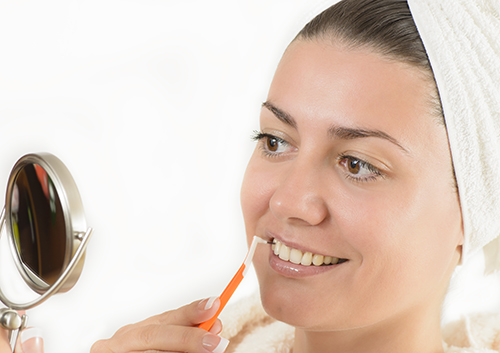Take Your Pick!
July 29th, 2020

Before electric toothbrushes, before dental floss, before fluoride rinses, in fact, before recorded history, people who cared about their dental health had one primary tool—the toothpick. Ancient bronze toothpicks, bejeweled Renaissance picks, and the more humble modern wooden picks have been instrumental in promoting dental hygiene for centuries.
And, while that clean, simple design is still a good one, modern technology has found a way to build an even better toothpick. Today’s interdental picks not only dislodge food particles effectively, but now gum stimulation, cleaner orthodontic appliances, and fresher breath are available literally at our fingertips. Most important, these picks are just as effective as floss for removing plaque.
- Wood? Still Good!
Today’s softer wooden picks come in several shapes designed to fit comfortably and snugly between the teeth. Using a gentle in-and-out motion, you can clean between your teeth as you remove plaque from the tooth surface. But that’s not the only benefit! As you move the wide end of the pick up and down between teeth and gums, you are actually stimulating your gum tissue as well. They even come with mint flavoring to refresh your mouth as you clean. And, of course, wood and bamboo picks are biodegradable.
- Plastic? Fantastic!
If you’d like something a little more yielding than wooden dental picks, you have options. Soft dental picks are available that use rubber “bristles” on a plastic stem to gently ease their way between teeth. The heads are available in different diameters to accommodate tight or wide spacing between the teeth. Straight or curved stems provide the accessibility you need. If you have latex allergies, be sure to choose a rubber product that is latex-free.
- Interproximal Brushes? Here’s What the Buzz Is
You might have missed these miniature brushes in the dental care aisle, but they are worth looking for. Interproximal brushes have small cone-shaped heads with nylon bristles for cleaning food particles and plaque from between the teeth. They are good for more than one use, and some are available with angled or bendable handles for hard-to-reach spots. They come in different diameters, from wide to extremely fine, to suit the spacing of your teeth. Interdental brushes are especially useful for braces wearers, who can use these clever tools to clean tight, tricky areas under wires and around brackets.
Even though bronze, bejeweled, or golden toothpicks aren’t available in the dental aisle of the local drugstore, increased efficiency and function are well worth the trade-off. If for any reason you have trouble flossing, or if you like the idea of massaging your gums as you clean your teeth, or if you wear braces, or if you want a burst of mint flavor—for any number of reasons today’s dental picks are worth a try. Talk to Dr. Bill Whitley at your next visit to our Dallas office, and we’ll be happy to give you some recommendations.


